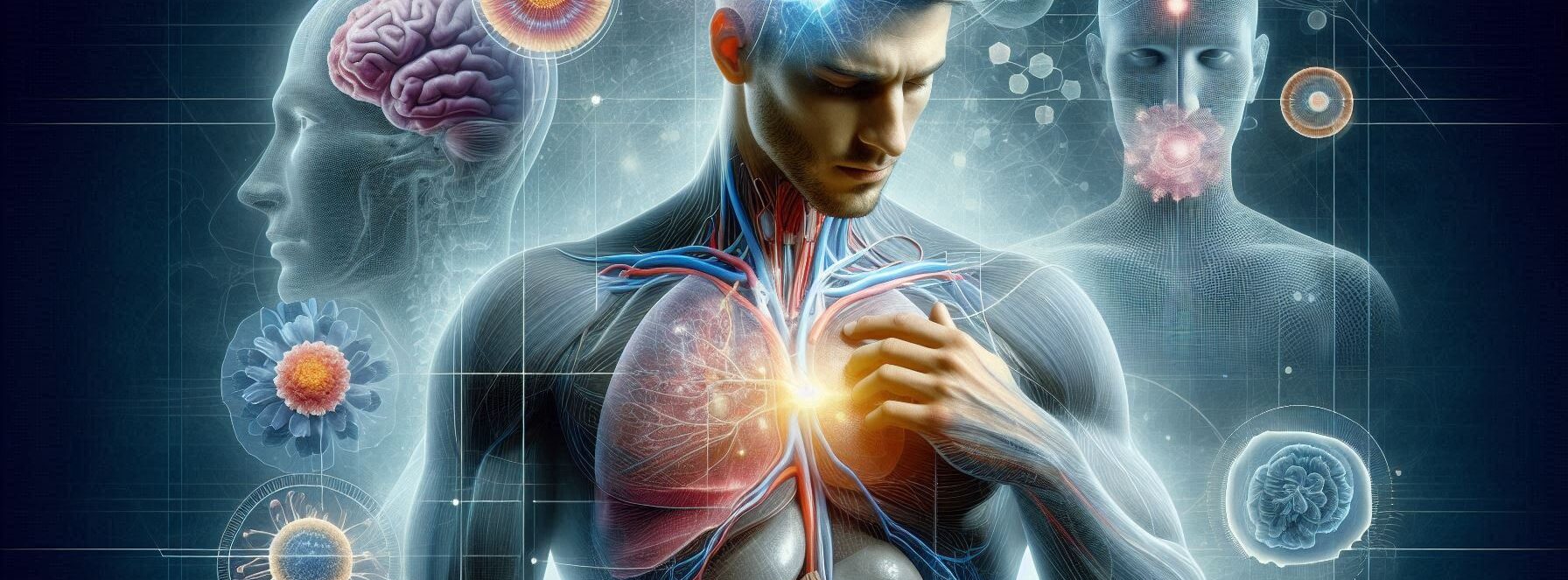You know that feeling when you wake up, and your body feels like it’s been run over by a truck driven by a very confused raccoon?
Yeah, we’ve all been there. It’s amazing how much our physical state can impact our mental wellbeing. In fact, the connection between our minds and bodies is so strong that it makes you wonder if they’re secretly plotting against us or just trying to keep us on our toes.
Let’s dive into this fascinating world where jogging meets journaling, and sweat mingles with self-care.
Top Takeaways and Key Concepts
- Prioritize regular exercise to release endorphins and reduce anxiety or depressive symptoms.
- Ensure sufficient sleep to support mental clarity and maintain emotional balance.
- Eat nutrient-rich foods and stay hydrated to fuel your brain and stabilize mood.
- Practice stress management techniques like mindfulness, deep breathing, or hobbies daily.
- Maintain social connections to create emotional support and enhance overall wellbeing.
Summary of This Article
This article emphasizes the strong mind-body connection, showing how physical health directly influences mental wellbeing. Exercise boosts endorphins, improving mood and reducing stress, while sleep supports cognitive function and emotional stability. Nutrition, including a balanced diet and proper hydration, fuels the brain and prevents irritability. Managing stress through mindfulness, deep breathing, and enjoyable hobbies helps regulate emotions, and maintaining social connections provides essential support networks. Overall, the article highlights that small, consistent actions across exercise, nutrition, sleep, stress management, and relationships collectively enhance mental health and resilience.
The Science Behind It All

Let’s see what science has to say about the mind-body connection. Interestingly enough, research shows that physical health plays a significant role in mental wellbeing.
When we exercise—yes, even those dreaded 5-minute workouts—we release endorphins. These little chemicals are like nature’s happy pills!
They make us feel good, reduce stress, and can even help alleviate symptoms of anxiety and depression.
By the way, have you ever noticed how much better you feel after a brisk walk? It’s as if your brain suddenly decides to throw a party for all the neurotransmitters!
I mean, who wouldn’t want to dance with dopamine? On the flip side, when we’re sedentary—like binge-watching an entire season of a show in one sitting—our bodies can start feeling sluggish.
This sluggishness doesn’t just affect our bodies; it creeps into our minds too. Suddenly that pile of laundry looks like Mount Everest!
And speaking of laundry piles, let’s not forget about sleep! A good night’s rest is crucial for both physical recovery and mental clarity.
If you’ve ever tried making decisions while running on three hours of sleep (or less), you know exactly what I mean. You might find yourself convinced that buying ten inflatable flamingos for your backyard is a brilliant idea—until morning comes along with its harsh light of reality.
Nutrition: Fueling Your Brain
Honestly, let’s talk about food because who doesn’t love discussing snacks? What we eat affects not only our waistlines but also our brains!
Imagine trying to drive a car on empty; it wouldn’t go very far before sputtering out—and neither will your brain if it’s fueled by junk food alone.
Eating nutritious foods can enhance cognitive function and improve mood. Foods rich in omega-3 fatty acids (like fish) are known to support brain health while fruits and vegetables provide essential vitamins that help maintain emotional balance.
Ever heard someone say they were “hangry”? That phrase wasn’t invented for fun—it highlights how low blood sugar can send emotions spiraling faster than my dog chasing after squirrels!
Interestingly enough, people often overlook hydration as part of nutrition. Dehydration can lead to fatigue and irritability; it’s like waking up from hibernation only to find out you’re still stuck in winter!
So remember: drink water—not just because your skin will thank you but also because your mind needs it too!
Exercise: Moving Towards Happiness
Speaking of moving towards happiness… exercise isn’t just about losing weight or fitting into last year’s jeans; it truly influences mental health positively!
Remember when I mentioned endorphins earlier? Well, they’re not just there for decoration—they’re working hard behind the scenes whenever we get active.
Now don’t get me wrong; I’m not suggesting everyone should become Olympic athletes overnight (unless that’s your dream!).
Even moderate activity counts—like dancing around your living room while pretending you’re on “Dancing with the Stars.” Trust me; you’ll be surprised at how liberating it feels!
As an anecdote from my own life: I once decided to join a yoga class thinking I’d achieve inner peace and flexibility akin to a pretzel—but instead found myself tangled up like spaghetti during downward dog!
However awkwardly I contorted myself though, afterward I felt lighter mentally—and hey, that’s half the battle won right there!
Stress Management Techniques
To be fair, managing stress is crucial for maintaining both physical and mental health. Life throws curveballs at us faster than my cat leaps off furniture during an unexpected noise (which happens quite frequently).
Finding effective stress management techniques helps keep those pesky cortisol levels in check.
Some popular options include mindfulness meditation—which sounds fancy but really just means sitting quietly while trying not to think about pizza—or deep breathing exercises that help calm racing thoughts down quicker than realizing you’ve forgotten something important at home.
Interestingly enough, hobbies play an essential role here too!
Whether it’s painting landscapes or knitting sweaters for imaginary pets (hey—no judgment!), engaging in activities brings joy back into life—even amidst chaos.
Social Connections Matter
Let’s see… We can’t forget about social connections either! Humans are social creatures; we thrive on relationships with others—even if sometimes they drive us bonkers (thanks Aunt Edna!).
Having supportive friends or family members creates an emotional safety net that enhances overall wellbeing.
Sharing experiences or simply having someone listen without judgment makes challenges easier to navigate—the equivalent of having GPS instead of relying solely on old-school paper maps (remember those?).
As someone who once got lost driving around town because I was too stubborn to ask for directions—I assure you sharing burdens lightens them significantly!
Conclusion: Bringing It All Together
All things considered, understanding the mind-body connection reminds us that taking care of ourselves physically directly impacts our mental health—and vice versa!
So whether you’re hitting the gym regularly or munching on veggies while catching up with friends over coffee—know this: every small step counts toward creating balance in life.
So next time you’re feeling down or overwhelmed by life’s hurdles remember—you have tools at hand!
Get moving physically through exercise or indulge yourself with nourishing foods; reach out socially whenever possible…and yes—even dance like nobody’s watching occasionally…because who knows?
Suggested Resources:
Understanding Childhood Trauma
https://www.nctsn.org/what-is-child-trauma
The Benefits of Exercise for Mental Health
https://www.mhanational.org/benefits-exercise-mental-health
Nutrition’s Role in Mental Health
https://www.psychologytoday.com/us/blog/the-moment-youth/202009/nutrition-and-mental-health
Frequently Asked Questions
How does physical health influence mental wellbeing?
Physical health impacts mood, energy, and cognitive function. Regular movement, proper nutrition, sleep, and hydration support emotional balance and reduce stress.
Why is exercise important for mental health?
Exercise releases endorphins that boost mood, reduce anxiety, and improve overall emotional resilience, even with light or moderate activity.
How does sleep affect mental wellbeing?
Sleep allows the brain to recover and regulate emotions. Poor sleep can lead to irritability, trouble thinking clearly, and heightened stress.
Can nutrition really improve my mental health?
Yes. Nutrient-rich foods fuel the brain, stabilize mood, and prevent irritability, while hydration supports energy levels and focus.
What role does stress management play in the mind-body connection?
Stress management techniques like mindfulness, deep breathing, and hobbies help regulate emotions and reduce the physical impact of chronic stress.
Do social connections affect mental wellbeing?
Supportive relationships provide emotional safety, reduce loneliness, and strengthen resilience, helping you cope better with everyday stressors.
What small daily habits support both mind and body?
Short walks, balanced meals, consistent sleep, hydration, and simple relaxation practices build strong, sustainable mind-body wellness.

Kevin Collier is a passionate mental health advocate and writer for SadFAQ.com, where he explores the complexities of depression and mental well-being. With a deep understanding of mental health challenges, Kevin provides compassionate insights and practical advice to help individuals navigate their journeys toward healing. His articles aim to destigmatize mental health issues, offering support and resources for those seeking to improve their emotional resilience. Committed to raising awareness and fostering open conversations, Kevin’s work empowers readers to prioritize their mental health and seek the support they deserve.




